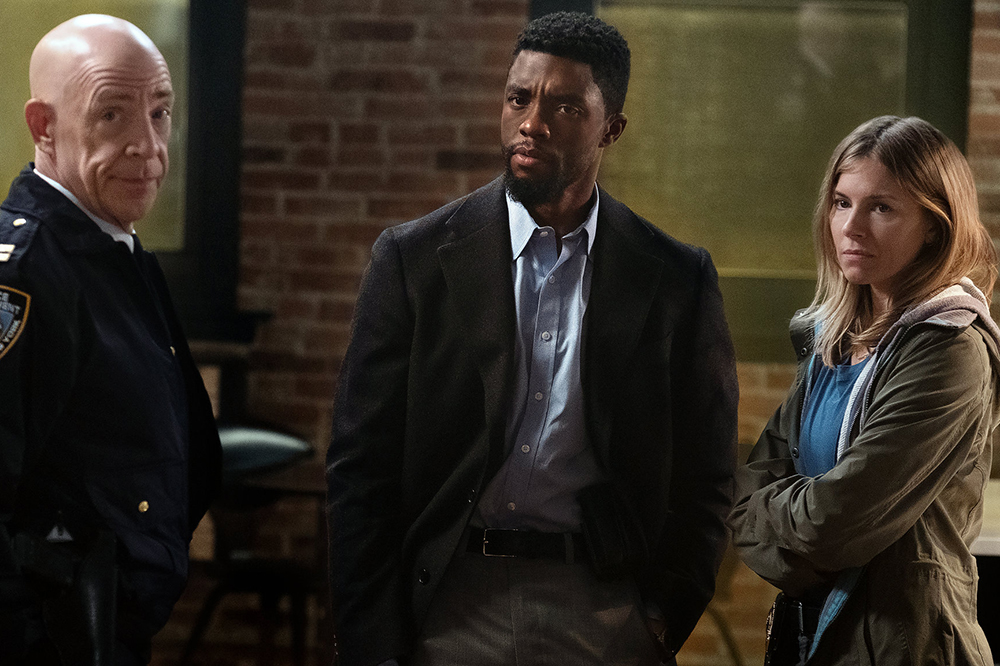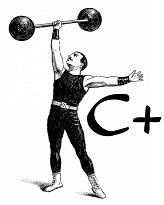Scrolling through streaming options weekly, I think I’ve purposefully avoided the Brian Kirk-directed “21 Bridges” every time it comes up. It’s not lost on me the reason for this is likely the film is one of late actor Chadwick Boseman’s last films, though he received nominations for his role in 2020’s “Ma Rainey’s Black Bottom.” “21 Bridges” hasn’t fared well with critics on Rotten Tomatoes (54%), though audiences loved it (91%). And on the surface, there’s nothing wrong with the film. It’s a standard cop-led actioner that would have felt at home in the 1990s — except it isn’t. The film, with good acting, set pieces, and scope (the whole island of Manhattan is closed down overnight as Boseman’s character looks for a pair of cop-killers) feels like it wants to make a message. But in the end it concludes a bit too neatly to really hammer it home.
The film opens with a memorial service for a fallen police officer, who we learn is the late father of Andre Davis (Boseman). He was killed while fighting off three perps. He killed two of them, but the third got the best of him (we don’t find out the extent of this until much later). That this scene takes place in a church — with the pastor talking about how Andre’s father “punished” two of the perps before he died — feels off. Andre will of course become a police officer; this is given from the trailer. But the way he sits next to his mom, a solemn tear running down his cheek, feels uncomforted and terse. As does the next scene, as he’s (now a cop) interrogated by Internal Affairs for discharging his weapon. He’s killed 8 perps in 10 years and is branded the “cop who kills cop killers.”
A Set of Morals, Albeit at Times Confusing
This sets up an interesting character, and one we can care about and explore. Why did he discharge his weapon at those subjects? What kind of cop is he? In his final words to his son — read by the pastor at the funeral mass — his father said he will have the means to know what is right, and that no one can tell this to him. “21 Bridges” of course sets up a moral dilemma for him during the film. However, it feels off given the situation constructed. He is chasing two men, Michael and Ray (Steven James, Taylor Kitsch) who are, in fact, cop killers. And screenwriters Adam Mervis and Matthew Michael Canahan set up a by-the-numbers situation full of twists and turns (some predictable, especially the opening robbery sequence) that tries to shift Boseman into an action role when I feel there was more meat to the story.
The acting is good here from most of the players, although the three best are Boseman, veteran actor J.K. Simmons (menacing here), and Sienna Miller, who is unrecognizable as narcotics officer Frankie Burns. The robbery-gone-wrong has left 8 officers dead (the shootout is a bit graphic, and the movie earns its ‘R’ rating) and an enormous amount of cocaine behind. The ensuing discussion — as Davis, Burns, and two FBI officers discuss where that kind of weight could be moved amused me, especially as Davis eliminates my hometown, Utica — has that Sherlock Holmes meets Detective Somerset (“Se7en”) feel.
Of Cop Codes, Dirty Police, and Ambivalent Heroes
A majority of the rest of the film involves Davis hunting down the cop-killers. And though he unravels a deep conspiracy, more can’t be said without approaching spoilers. On the manhunt we see Davis flourish — especially as he interrogates one witness and coaxes information out of her. But the film also sets up some paradoxes. For instance, why does he fail to shoot Michael several times when he has the opportunity? Why does this cop-killer-killer constantly rebuke Simmons’ Captain McKenna and NARC Officer Burns’ flippant requests to just kill the perps, regardless if they can be taken peacefully? There’s much of the ‘cop code’ attitude here, but also more. It’s clear that Davis isn’t the shoot-first-ask-questions-later loose cannon everyone thinks he is. But Brian Kirk and the writers don’t take a lot of time to flesh it out.

Boseman does a good job with the material he’s given, and you can’t fault him that it doesn’t go as deep as it needs to. He’s an integral cop. Two scenes — one on a subway train against Steven James and another in a kitchen with J.K. Simmons show a depth and range a better script could have fleshed out. There’s a morality to Davis swallowed by “21 Bridges,” to its loss. We never learn more about his past shootings, nor the relationship he has with his ailing mother (Adriane Lenox). There’s a bunch of rationalizations at the end about cops’ sacrifice and feeling the short end of the stick of a city that needs them but resents them. But given the police corruption uncovered, the gripes ultimately fall on deaf ears. And given the fact that Michael and Ray have killed cops, it leaves both sides without moral ground.
But Still, Great to See Boseman One Last Time
All-in-all, “21 Bridges” is still a solid watch. It keeps your attention for its 1 hour and 39 minutes due to its action approach and Boseman’s liability. It does itself a disservice trying to use Andre Davis as an action prop when the film’s about something more. However, the film still works as a throwback actioner even if it skips over its deeper treasure. Boseman received a nomination for ‘Outstanding Actor in a Motion Picture’ from the Image Awards (NAACP), and, if you haven’t seen the film, it’s a nice way to see Boseman once last time. It doesn’t reinvent the genre but it tries. And maybe that’s enough.
“21 Bridges” is currently available to watch on DH-One TV Network, Netflix, Prime Video, Vudu, Redbox, or Apple TV.



